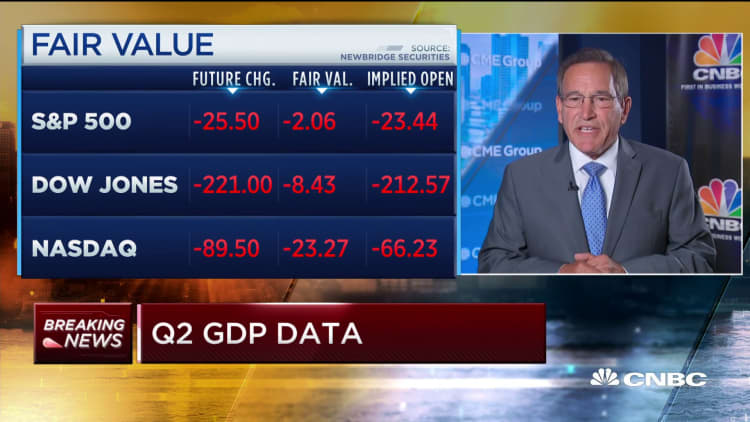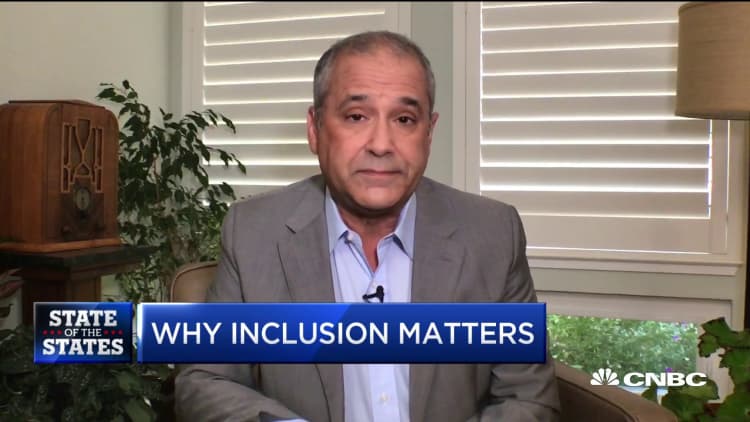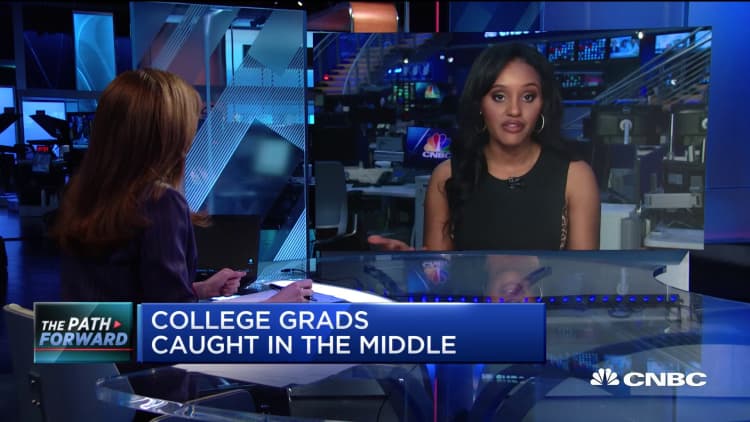KEY POINTS
- With coronavirus infections still surging across the U.S., many companies are turning to virtual career fairs as a hiring strategy.
- Career experts claim 80% of recruiting will be virtual for the foreseeable future.
- Among the benefits of a virtual job fair: no setup, hiring is accelerated, and geographic boundaries and travel expense are eliminated.
- Studying up on the participating companies’ backgrounds and demonstrating excellent communication skills are ideal traits for landing a job virtually.

Due to social distancing, hundreds of virtual job fairs have been taking place globally, with companies both large and small joining in. Here, nonbank consumer lender loanDepot holds a virtual job fair on Facebook.
Diana Olick | CNBC
With coronavirus infections still surging across the U.S., many companies are turning to virtual career fairs as a hiring strategy. While not new, the concept has been gaining ground since the pandemic began. Hundreds of job fairs have been taking place globally, with companies both large and small joining in. The latest to enter the foray is early career platform Handshake.
As a result of the widespread shift to remote work, Handshake, a career networking platform aimed at college students, announced Wednesday its own end-to-end digital job fair solution, which will allow universities and companies to host virtual recruiting events and job fairs. The new platform will facilitate large-scale virtual job fairs for universities and employers so that students have access to increased opportunities to both network and stand out in the job application process.
This is good news for the approximately 17 million Americans out of work today and the 6 million-plus graduates who have entered into this brutal job market.
According to Handshake’s April survey, 73% of recent college graduates are still searching for full-time jobs, and 23% of students had their internship offers rescinded. While the unemployment situation is dismal for both graduate and undergraduate students, many Americans have lost their jobs or are struggling to obtain new opportunities amid the coronavirus pandemic. The national unemployment rate was 11.1% in June 2020, ranking 7.4% higher than it was in June 2019, according to the Bureau of Labor Statistics.
What is a virtual job fair?
Virtual job fairs take place at a designated time and are similar to a webinar. Recruiters and job seekers meet in a virtual space via chat rooms, teleconferencing, webcasts, and/or email to exchange information about job postings.
Rather than just reviewing resumes,hiring managers will be able to meet candidates face to face, interview them and make offers right on the spot. Virtual hiring takes the hassle, time and expense out of attending a traditional job fair and helps recruiters and employers interact with potential employees from all over the world and a variety of disciplines.
Employment platform CareerBuilder has been hosting virtual career fairs for universities and companies alike since 2013. However, Chris Salzman, health-care director at CareerBuilder, has found that since the onset of the pandemic, more companies are embracing virtual career fairs as a primary resource rather than a supplementary or creative resource. “It’s become more of the staple, the norm and the necessity,” he said.

Kraft Heinz recently conducted a virtual job fair to hire their summer interns.
Kraft Heinz
Today the most active sectors in this arena are financial services, health care, nonprofit, internet and software, claims Handshake.
Through the use of virtual career fairs and Handshake’s new platform, employers have the opportunity to search for students across thousands of partner universities that meet the criteria and qualifications of their position. It will also enable universities to build stronger relationships with employers that don’t typically recruit from their school.
“This will become the opening for how a university or career center can establish a relationship with some of those employers. … They should be able to attract more employers then they’ve had in the past,” said Christine Cruzvergara, Handshake’s vice president of higher education and student success.
How a typical career fair works
Virtual career fairs are not limited to college students and entry-level roles. FlexJobs, another virtual recruiting platform, primarily caters to filling more experienced and managerial positions. While these roles often require additional experience and technical skills, attending virtual job fairs can be advantageous for people looking to pivot industries or get one-on-one time with a recruiter for a role they may be passionate about, according to Brie Reynolds, career development manager at FlexJobs.
WATCH NOW
VIDEO00:44
U.S. weekly jobless claims total 1.434 million
For dedicated client virtual fairs, career platforms can provide the software, marketing and even prescreening of candidates so that recruiters from a company can connect with a variety of qualified candidates for their specific openings. Attendees provide their resume and contact information at registration, and after joining a lobby and being presented with options, they can either initiate one-to-one conversations with recruiters or join group conversations.
CareerBuilder recently facilitated a targeted event for a client seeking interested, qualified and screened nurses. “We had over 300 people scheduled for the event, over 100 recruiter chats and over 75 qualified candidates, and they ended up making 35 offers,” said Salzman.
For career fairs with multiple employers, career platforms use intricate software to replicate a ballroom with Zoom “rooms” and chat boxes with recruiters for each company. Employers are able to facilitate interactive panels and discussions to share more about the positions that they are hiring for, as well as more about their company culture and values. Attendees may curate their schedule in advance or visit multiple “rooms” of their choosing throughout the day, asking questions in the group setting or initiating a one-to-one text or audio chat with a recruiter.
According to Reynolds of FlexJobs, recruiters often expect the attendee to initiate any follow-up after the fair. “When you’re applying for the job after the fair, make sure to mention in your cover letter which recruiter you talked to. … It’s good to reiterate that you’re already active and are seeking out this company in particular,” she said.
Reynolds also encourages attendees to connect with recruiters on LinkedIn and include a message about their conversation at the fair. “You have given yourself an advantage if you’re using the info you learned at the fair and the recruiter connection.”
WATCH NOW
VIDEO02:05
Here’s what some states are doing to drive inclusiveness
Tips to prepare for the virtual job fair
Virtual job fairs are much different from the in-person experience, so preparation is vital to success and to build a lasting impression on a recruiter or employer. Those who can adapt will have a great advantage. Here are some key ways to put your best foot forward and maximize your time with a recruiter.
Do your research. One of the most common pieces of advice from recruiters and career services utilizing virtual career fairs is to do your research. Cruzvergara urges candidates to cross-reference their research with company reviews on platforms like Handshake to inform smart questions for recruiters. “Think of questions that would allow you to get deeper knowledge about the culture of the organization, what it means to be able to move up in that organization, or what it is you would be able to contribute or learn in that organization.”
Sharpen your communication skills. According to Jenny Petru, corporate recruiting manager at Regency Integrated Health Services, who has worked with CareerBuilder on virtual recruiting, “The best way a candidate can stand out is good communication skills and good grammar skills. … In a virtual world, you don’t want to write like you’re texting a friend; you still want to have that professionalism.”
Don’t give up. To make the most of this opportunity, Trappey encourages candidates to put themselves out there and overcome any apprehensions they may have about virtual recruiting. “The key to finding a job or an internship is to keep trying. Just say yes to a virtual event or go to LinkedIn to make those connections yourself. Having the confidence to do that even if you feel awkward is integral to landing a job no matter where you are.”
Benefits of virtual recruiting
Despite lacking in-person interaction, virtual career fairs and virtual recruiting still offer job seekers an opportunity to connect with employers and form a lasting connection.
In fact, experts predict that even after the pandemic, there will be no rush to revert to traditional, in-person job fairs. According to a survey conducted by Handshake in early April that polled 112 of their partner employers, 80% of recruiting will remain virtual for the foreseeable future, and 60% say that even if travel were safe, they would still decrease their on-campus presence.
Here are some of the ways online job fairs provide benefits for candidates across different experience levels, employers and universities.
Engages more candidates. While virtual career fairs existed prior to the pandemic, the coronavirus has been a critical catalyst for accelerating the use of virtual recruiting as a primary resource for employers. “It accelerated people’s openness to being willing to think about a virtual strategy and to really use the tools that would allow them to engage more qualified students across more institutions,” said Cruzvergara.
Saves time and money. With career fairs now online, employers no longer need to spend days setting up an event, travel expenses for both the candidates and recruiters are eliminated, and there are no geographic boundaries. In addition, recruiters are able to participate across multiple shifts throughout the day, allowing them to resume normal work operations before and after.
Opens up more conversations. In addition, the variety of available methods for interacting with recruiters can effectively cater to the different needs and preferences of candidates, allowing them to feel more comfortable in the recruiting process.
“In this sort of isolated time, virtual events generally do give that interaction and space to speak freely to the company. … These sort of events are a way to put a face to a name and make a connection so you can move forward in that process later,” says Amy Trappey, senior director of customer success at female-oriented career platform Power to Fly.
WATCH NOW
VIDEO01:42
How college grads got stuck in the middle of the coronavirus economic fallout
The nature of virtual recruiting also permits candidates to seek multiple job openings and interact with a number of employers without the barriers of travel and wait times. “It can be even more effective for the recruiter because they are able to carry five to 10 conversations with candidates at the same time,” said Salzman of CareerBuilder. “Same goes for job seekers, they are able to vet out more opportunities or attend three or four virtual career fairs in a day, instead of the old way and in person. … It’s a more efficient type of process.”
For job-seekers of greater experience levels looking to switch roles, careers, or industries, these virtual career fairs can be a great opportunity to learn more about the skills needed in different roles and highlight one’s transferable skills to the recruiter, added Reynolds from FlexJobs.
Provides greater campus outreach. Virtual tools certainly allow for an increase in exposure and outreach in the university setting. Hayden Kornblut, head of university relations at Kraft Heinz, explained that all of their upcoming fall recruiting events will be fully virtual. This will result in new opportunities to connect with talent from a larger variety of college campuses and allows more of their own employees to communicate with potential candidates.
“We’ll still be doing “campus events,” like information sessions, coffee chats and case-study works virtually, but our plan is to also do larger-format virtual events, where we’re focused on getting out in front of underrepresented students and campuses that we traditionally haven’t targeted before,” said Kornblut. “We want to make sure we are working with campuses and universities that reflect our company and reflect our consumers.”
Offers a better avenue for sourcing diverse candidates. One of the greatest benefits of virtual recruiting is the ability to source diverse candidates from various backgrounds, locations and experiences.
Power to Fly identifies diversity as integral to the services they provide. “Our key job is helping women find jobs but also working with our clients to identify where they may need pushing in this area,” said Trappey. The company, which was originally created to get more diverse talent into companies’ pipelines, has also incorporated training and educational tools for candidates entering, re-entering, and even pivoting within the workforce, as well as a combination of on-site and virtual recruiting events for women of all skill levels and backgrounds.
“There’s so much strength in taking people from different backgrounds and perspectives when you’re hiring,” said Trappey. “There are tons of jobs in these fields, and sometimes it just requires a more open mindset in allowing people to train on the job. That is something that we constantly push at Power to Fly.”




